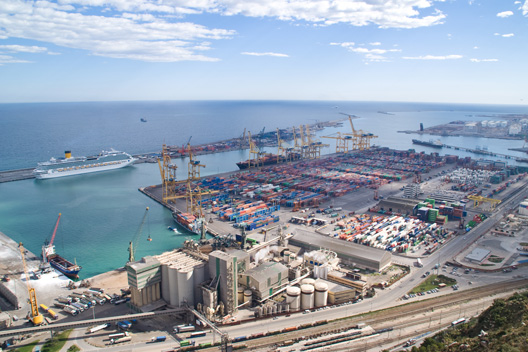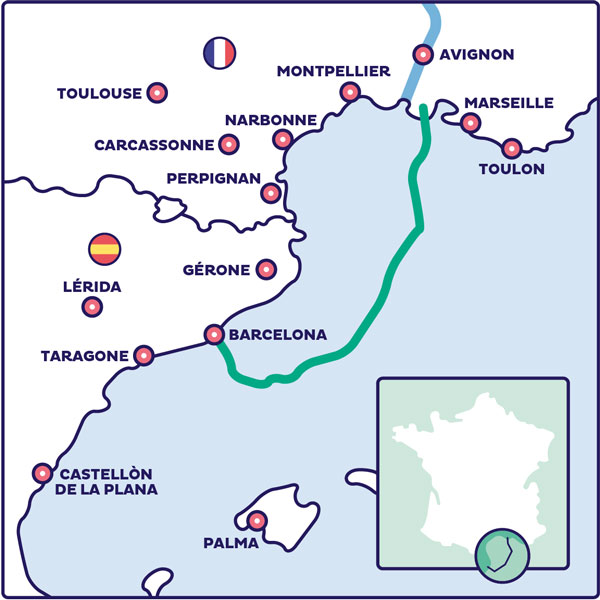H2Med

- German operator OGE joins Enagás, GRTgaz, REN and Teréga as H2Med promoter.
- The agreement was signed during the event “H2Med, an example of European energy cooperation”, held at the Spanish Embassy in Berlin.
- The event, which was attended by representatives of the governments and TSOs from Portugal, Spain, France and Germany, as well as European Commission and German industry, highlighted the key role of H2Med in meeting the European REPowerEU targets of the European Union.
“H2Med represents a groundbreaking initiative as the world's inaugural green hydrogen corridor project, uniting several European nations."Thierry Trouvé
CEO of GRTgaz
Berlin, 18 October 2023. H2Med takes a stance as the first green hydrogen corridor for Germany, as reaffirmed by authorities, operators and industry at the event “H2Med, an example of European energy cooperation”, organized by the European Transmission System Operators (TSO) involved in this project.
OGE, Transmission System Operator in Germany, has signed a memorandum of understanding with the TSOs of Spain (Enagás), France (GRTgaz and Teréga) and Portugal (REN) to promote the European H2Med green hydrogen project and correspondent corridor. This project, submitted to the call for European Projects of Common Interest (PCIs) last December, includes a connection between Celorico da Beira in Portugal and Zamora in Spain (CelZa), and a maritime connection between Barcelona and Marseille (BarMar).
OGE’s support, as well as for the associated hydrogen transport infrastructures in each of these countries has been materialised with the signing of a memorandum of understanding at the Spanish Embassy in Germany during the event.
The event has been opened by Franziska Brantner, Parliamentary State Secretary of the German Federal Ministry for Economic Affairs and Climate Action; Mechthild Wörsdörfer, Deputy Director General of Energy at the European Commission; Manuel García, General Director of Energy Policy and Mines of the Ministry for the Ecological Transition and Demographic Challenge of Spain; Ricardo Martínez, Spain’s Ambassador in Germany; François Delattre, Ambassador of France in Germany, and Francisco Ribeiro de Menezes, Portugal’s Ambassador in Germany, among other authorities.
Representing the Transmission System Operators in the roundtable “Boosting together H2Med” were the CEO of Enagás, Arturo Gonzalo; the Chairman and CEO of REN, Rodrigo Costa; the CEO of GRTgaz, Thierry Trouvé; the Chairman and CEO of Teréga, Dominique Mockly; and the Chief Financial Officer of OGE, Frank Reiners.
Dr. Frank Reiners, CFO of OGE stated: “A hydrogen pipeline connecting Portugal, Spain, France and Germany represents more than just a vital hydrogen import corridor. It symbolizes a powerful bridge toward a sustainable future. It connects the most efficient regions for hydrogen production with the regions where it is most needed, it fosters international collaboration, harnessing the potential of clean energy to enable progress, and unites our countries in a common pursuit: to reach the European target of climate neutrality by 2050”.
The CEO of Enagás, Arturo Gonzalo, said that “the incorporation of OGE into H2Med is key because it means that in addition to having the support of the governments of Portugal, France, Spain and Germany, the TSOs of the four countries will work together to make the project a reality”. Arturo Gonzalo also emphasised that “the Berlin event has highlighted the real need for H2Med to bring together supply and demand for green hydrogen in Europe. We are talking about cooperation, decarbonisation and energy sovereignty for Europe”.
In the words of GRTgaz, CEO Thierry Trouvé, “H2Med represents a groundbreaking initiative as the world's inaugural green hydrogen corridor project, uniting several European nations. This project embodies Europe's commitment to establishing a robust hydrogen market, aimed at decarbonizing both industry and mobility within the continent while ensuring a reliable domestic supply."
The Chairman and CEO of REN, Rodrigo Costa, stressed that “the H2Med project, comprising the two interconnections between Portugal and Spain (CelZa) and between Spain and France (BarMar), is key and crucial to the hydrogen green corridor connecting the most western part of continental Europe to central and northern Europe. This project and its national backbones provide a route for competitive hydrogen, and contribute for a more integrated and independent European energy market, incorporating a new energy vector relevant for the decarbonisation and energy transition of Europe, and a viable mean for the materialization of flexibility in sector coupling with electricity under strong renewables integration”.
In this regard, Chairman and CEO of Teréga, Dominique Mockly, noted that “H2Med is not just a project, but a visionary bridge to a sustainable future, designed to drive progress and energy sovereignty across Europe. It unites regions of competitive hydrogen production with areas of high demand, fostering international collaboration and advancing clean energy to achieve our common goal: the European target of climate neutrality by 2050“.
A European agreement
During the event, representatives of the European Union and the governments of Germany, France and Spain have shown their support for the development of H2Med as the first large-scale green corridor that will connect the Iberian Peninsula with northwest Europe, allowing renewable hydrogen to be transported from production areas to higher consumption areas also through the associated national hydrogen backbones.
The Parlamentary State Secretary of the German Federal Ministry for Economic Affairs and Climate Action, Dr. Franziska Brantner, stressed that “green hydrogen is at the heart of our decarbonization strategy in Germany. We have taken important steps to accelerate the development of the national Hydrogen core network (“Kernnetz“) and to create favourable conditions for a rapid and successful market ramp-up. We strongly support the development of the Southwest Corridor with H2Med and its extension to Germany. To this end, we are working with our European partners to build a sustainable and innovative European hydrogen network”.
Representing the European Commission, the Deputy Director General of Energy, Mechthild Wörsdörfer, pointed out that “hydrogen is a top priority for the European Union”, and added that “we need also the infrasructure, which is a key point, a big priority for Europe”.
On behalf of the General Director of Energy Policy and Mines of the Ministry for the Ecological Transition and Demographic Challenge of Spain, Manuel García, “no market is possible if goods and services cannot be exchanged; for that to be possible, we need transnational infrastructures like H2Med Project. H2Med is the best example of a truly European energy cooperation and, when operational, it will contribute to reinforcing our energy security and decarbonizing our industries”.
Progress in the development of H2Med
The H2Med project and the projects associated with the corridor of which it is a part, are already making positive progress in the process to acquire the qualification as Projects of Common European Interest (PCI).
The European Commission will publish its proposed PCI list in November 2023, which will be confirmed in early 2024 by Parliament and the Council. From then on, the projects would be eligible for receiving CEF-E funds for studies and construction, which would allow work to be expedited to guarantee the start of construction from 2026 and its entry into operation in 2030.
Support from German industry
Germany is actively seeking the ramp up of a hydrogen economy. By 2030, according to the information provided by Germany to the European Commission in the context of the selection of Projects of Common Interest, the consumption of hydrogen, including its derivatives (ammonia, methanol or synthetic fuels) is expected to reach 130 Terawatt Hours in Germany, of which between 50-70% would be covered with hydrogen imports.
H2Med will transport green hydrogen produced in Spain and Portugal, supplying northwest European countries, mainly Germany, with up to two million tonnes, representing 10% of the total consumption target for Europe set by REPowerEU.
The panel discussion “The vision of the German hydrogen market” was attended by the Director General for Economic Stabilization and Energy Security of the German Federal Ministry for Economic Affairs and Energy, Dr. Philipp Steinberg, together with the CEO of Thyssenkrupp, Miguel Ángel López Borrego; the CEO of Zukunft Gas and Chairman of the Natural & bioGas Vehicle Association (NGVA), Timm Kehler; the CEO of Deutsche Energie-Agentur (Dena), Kristina Haverkamp, and the CEO of EWE AG, Stefan Dohler.
Press contact
To go further

Development of H2MED
